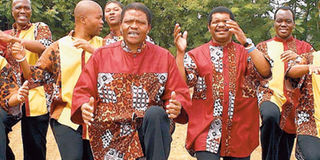Black Mambazo, Africa’s musical jewel

Members of Lady Smith Black Mambazo giving one of their iconic performances. Photo| FILE
What you need to know:
- Lady Smith Black Mambazo receiveD a life time achievement award marking their long reign as the kings of the sa choral scene
This week marked a milestone achievement for South African choral group, the Lady Smith Black Mambazo, after they were honoured with a Lifetime Achievement Award at the annual South Africa Music Awards.
As South Africa marked 20 years ever since the first multi racial elections took place, it was a worthy recognition for the group that has entertained Africa in times of joy and sorrow.
The event held at the Sun City Super Bowl according to Balck Mabazo was South Africa’s way of showing gratitude for flying the flag high for over 50 years.
“The journey of Ladysmith Black Mambazo started in South Africa and the group was celebrated in South Africa before we became internationally acclaimed,” said Shabalala.
It is an acknowledgement of the group’s contribution to the cultural growth and fight for freedom.
“ During Freedom Month, we are proud to pay tribute to these national treasures and music ambassadors who have worked tirelessly to raise the global profile of Isicathamiya and Maskandi, two traditional music genres rooted in the South African soil,” said David du Plessis, of the Recording Industry of SA.
As a young black man growing up in the days of Apartheid South Africa, Joseph Shabalala dreamt of forming a Zulu choir whose music would change the world.
More than 50 years later, Lady Smith Black Mambazo have won three Grammy Awards recorded with giants such as Stevie Wonder and to add gloss they performed at the closing ceremony of the World Cup finals in South Africa.
But as the group turned 50 they celebrated with their ‘Back to the Hood’ tour which took them to South Africa’s townships, a backyard that launched them into international fame.
Shabalala, first brought together the choir on farmland near the town of Ladysmith.
During their early days they sang mainly at weddings, they were later to get involved in radio singing contests where they were eventually banned.
“It is a great way to go back with the people. Each time they show up it means they love you,” said Shabalala in Pretoria.
At 70 plus Joseph Shabalala smiles with the satisfaction of a man who has lived his dreams, singing the rhythms known in Zulu as Isicathamiya with the same passion he gave at Canergie Hall concert in New York three years ago.
Despite their success, Ladysmith Black Mambazo aka ‘the Axe’ is better known overseas than at home.
International fame arrived with a seemingly innocuous phone call one afternoon in 1985, Paul Simon was on the line asking Shabalala if they could meet.
Given their racial differences it wasn’t an arrangement that was acceptable for the Group Areas Act prohibited such unlawful association.
“I told him that I needed a special permit from the authorities,” Shabalala remembers. “He replied, ‘But what are we talking about? We are talking about music,” he said.
According to Shabalala when he finally made the journey to meet him he found so many people waiting to work with him.
The collaboration gave birth to Graceland, an album which was partly recorded in Johannesburg despite the international sanctions on the Whites only government.
It sold millions of copies and as a result a future collaboration with mega stars from Michael Jackson to Dolly Parton, 50 albums and a rare opportunity to entertain World icon Nelson Mandela when he won the Nobel Peace Prize in 1993.
At that age only patches of grey hair could betray Shabalala’s age as he sings, dances and jokes with band mates, three of whom are his sons.
Over 20 years after the fall of apartheid, he still relishes his freedom in modern South Africa.
“Then if you wanted to go to places where white people lived you needed a pass. In the new South Africa you can go anywhere you wish,” he says.
But even as the elderly crooner praises his homeland, South Africans’ taste has also changed.
Apparently there is more appeal for artistes such as Justin Timberland who is set to stage a show next month than Ladysmith’s traditional and religious tunes.
Some young people don’t understand our music, they are more into House Music and the like,” says one of the group’s latest acquisition, 25-year-old Mfanafuthi Dladla.




